

Bitte widersetzen!
05.02 - 11.03.22
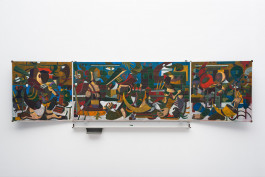
On Bitte widersetzen!
“This is the way things are now“ Mark Fisher states soberly in his book “Capitalist Realism: Is There No Alternative?“. This is the world the way it is now, there is no way to change it, however, it has not always been this way. Although, it is a common saying that history repeats itself, which suggests that it might has once already been that way and vice versa implies that there was once a better state of existence. In a way, we have reached an urgent perversion of our world that had been suffused with a multitude of other urgencies for as long as most of us can think. They have always had a dystopian sense; they were just less virulent and less palpable for the Western majority population: a sense of fatalism and resignation that surfaces as a pragmatic adjustment to the ghastly cruelties of life. In his first solo exhibition “Bitte Widersetzen“ (Please resist), Ferdinand Dölberg critiques a more preliminary stage of this kind of fatal mode of living: “Das machen wir schon immer so“ (We have always done it this way) is scribbled onto his work with the same title (2022) in three consecutive lines. The predominant material foundation he uses for the show are blackboards, alluding to his systemic criticism of structures capitalism spawns. Similar to Fisher’s critique, who while working in the Further Education sector recognized an enduring acceptance amongst his colleagues of the predestination that education will expandingly be designed based on business and market profitability, Dölberg visually and materially references academic, bureaucratic, and authoritative systems. Drawn with chalk, the earthy, uncanny colors, which have been fixed onto the blackboard in a labor-intensive process, consisting of more than five rounds in which Dölberg had to repetitiously repaint the forms, canopy the works with a gloomy cloak. In morgen kommen wir nicht wieder (2022) the centrally placed figure seems to be running in front of a checkered background whose squares are colored according to the blackboard’s pre-existent rectangular pattern. Attached with pink ties to the figure’s legs are disembodied heads, phenotypically akin to all other character’s faces in Dölberg’s work. None of the depicted distinctive characters have either a sex or gender but are identifiable through their moon shaped visages with deeply carved out eye cavities, hinting at the phenomenon of capitalist induced overwork – and to go one step further, they reference Karoshi, a Japanese term denoting death due to overwork. Reminiscent of Japanese masks used in an ancient form of theater called Noh, dating back almost 1000 years, they carry no expression, emanating an unsettling eeriness. When performers worked with these masks, they were carefully moving around light sources to disclose subtly the hidden emotion carved into each mask. The figure in Das machen wir schon immer so (2022) is wearing a tight checkered bodysuit while the one in morgen kommen wir nicht wieder (2022) is wearing a pine green suit out of a fabric that looks like velvet. Although the clothing in Dölberg’s works are not to be specified, “I often dress my characters intuitively“ says the artist, his painted garments can be contextualized within a broader practice in which checkered patterns and muddy-colored fabrics are utilized to signify punk and New Wave movements. He, moreover, applies a methodology of symbolism, functioning as a disruptive means to provoke political and social change: Dölberg evokes an amalgam of religious connotations and Dadaistic ways of thinking while nodding towards the contemporaneous importance of the past and future. Dadaists from the 20th century were deeply concerned with modes of flux, absurdity, experimentation, and psychic freedom opposed to the conventionally ordered world, which is likewise an antonjanizewski.com +49 (0) 176 832 485 13 info{at)antonjanizewski.com goethestrasse 69, 10625 berlin object of criticism in the artist’s work. The work Bitte Widersetzen (2021) imitates the formality of a triptych found in churches while it repudiates any kind of chastening values or orders. “Morgen kommen wir nicht wieder“ (Tomorrow we will not come back) is noted on another piece of the exhibition. Unlike Fisher, Dölberg is setting a less fatal vision for futurity. His Kafkaesque paintings are not just an analysis of authoritative systems but a subversion of the false logic capitalism spawns.
- Claire Koron Elat
In the Press
Single works
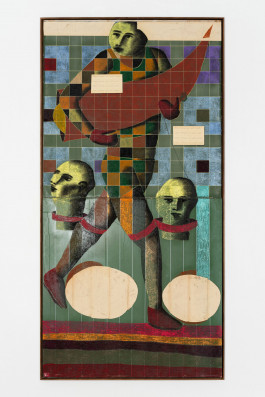
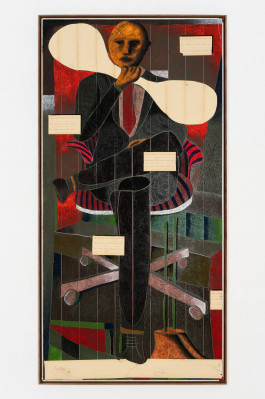
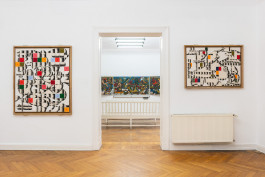
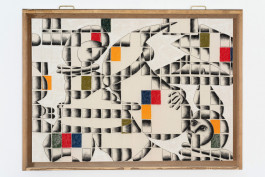
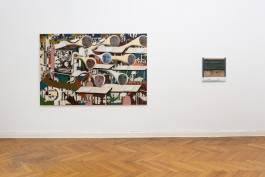
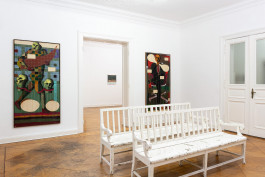
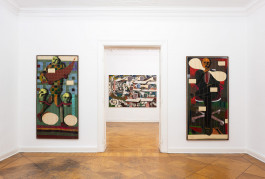
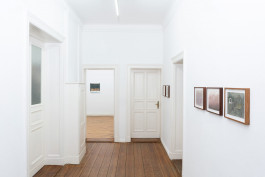
Single works
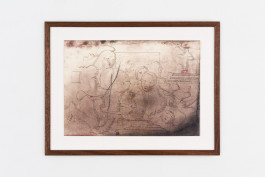
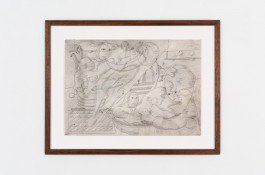
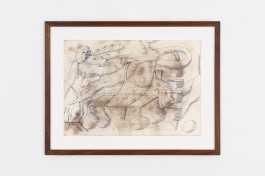
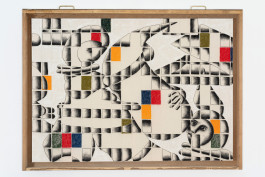
Bitte widersetzen!
05.02 - 11.03.22

On Bitte widersetzen!
“This is the way things are now“ Mark Fisher states soberly in his book “Capitalist Realism: Is There No Alternative?“. This is the world the way it is now, there is no way to change it, however, it has not always been this way. Although, it is a common saying that history repeats itself, which suggests that it might has once already been that way and vice versa implies that there was once a better state of existence. In a way, we have reached an urgent perversion of our world that had been suffused with a multitude of other urgencies for as long as most of us can think. They have always had a dystopian sense; they were just less virulent and less palpable for the Western majority population: a sense of fatalism and resignation that surfaces as a pragmatic adjustment to the ghastly cruelties of life. In his first solo exhibition “Bitte Widersetzen“ (Please resist), Ferdinand Dölberg critiques a more preliminary stage of this kind of fatal mode of living: “Das machen wir schon immer so“ (We have always done it this way) is scribbled onto his work with the same title (2022) in three consecutive lines. The predominant material foundation he uses for the show are blackboards, alluding to his systemic criticism of structures capitalism spawns. Similar to Fisher’s critique, who while working in the Further Education sector recognized an enduring acceptance amongst his colleagues of the predestination that education will expandingly be designed based on business and market profitability, Dölberg visually and materially references academic, bureaucratic, and authoritative systems. Drawn with chalk, the earthy, uncanny colors, which have been fixed onto the blackboard in a labor-intensive process, consisting of more than five rounds in which Dölberg had to repetitiously repaint the forms, canopy the works with a gloomy cloak. In morgen kommen wir nicht wieder (2022) the centrally placed figure seems to be running in front of a checkered background whose squares are colored according to the blackboard’s pre-existent rectangular pattern. Attached with pink ties to the figure’s legs are disembodied heads, phenotypically akin to all other character’s faces in Dölberg’s work. None of the depicted distinctive characters have either a sex or gender but are identifiable through their moon shaped visages with deeply carved out eye cavities, hinting at the phenomenon of capitalist induced overwork – and to go one step further, they reference Karoshi, a Japanese term denoting death due to overwork. Reminiscent of Japanese masks used in an ancient form of theater called Noh, dating back almost 1000 years, they carry no expression, emanating an unsettling eeriness. When performers worked with these masks, they were carefully moving around light sources to disclose subtly the hidden emotion carved into each mask. The figure in Das machen wir schon immer so (2022) is wearing a tight checkered bodysuit while the one in morgen kommen wir nicht wieder (2022) is wearing a pine green suit out of a fabric that looks like velvet. Although the clothing in Dölberg’s works are not to be specified, “I often dress my characters intuitively“ says the artist, his painted garments can be contextualized within a broader practice in which checkered patterns and muddy-colored fabrics are utilized to signify punk and New Wave movements. He, moreover, applies a methodology of symbolism, functioning as a disruptive means to provoke political and social change: Dölberg evokes an amalgam of religious connotations and Dadaistic ways of thinking while nodding towards the contemporaneous importance of the past and future. Dadaists from the 20th century were deeply concerned with modes of flux, absurdity, experimentation, and psychic freedom opposed to the conventionally ordered world, which is likewise an antonjanizewski.com +49 (0) 176 832 485 13 info{at)antonjanizewski.com goethestrasse 69, 10625 berlin object of criticism in the artist’s work. The work Bitte Widersetzen (2021) imitates the formality of a triptych found in churches while it repudiates any kind of chastening values or orders. “Morgen kommen wir nicht wieder“ (Tomorrow we will not come back) is noted on another piece of the exhibition. Unlike Fisher, Dölberg is setting a less fatal vision for futurity. His Kafkaesque paintings are not just an analysis of authoritative systems but a subversion of the false logic capitalism spawns.
- Claire Koron Elat
Single works











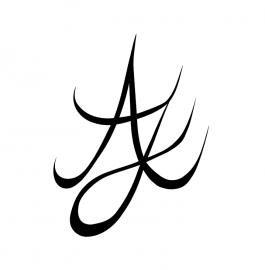
Anton Janizewski Galerie,
Anton Janizewski Galerie,